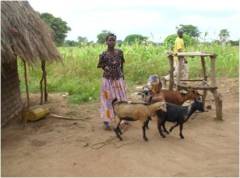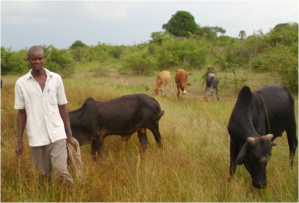Ability beyond disability
Yes, this is how we should see the disabled people in society. Gone are the days when people with disability were thought to be a nuisance and an object of pity to the Kenyan society. The notion that their work was only to beg by the street corners or when they were not allowed to borrow money from financial institutions etc. is so backwards. Disabled people in society have come forth to let the society know that there is nothing wrong with them, that with a bit of empowerment and acceptance they can do as well as any other person. When educated, they can perform well if not better than any other person – graduate, get jobs and fend for their families. When empowered, they can operate businesses just like any other businessman/woman.
This is well demonstrated by Atamaisi – a disabled farmer group. This group was formed in July 2011, consists of 25 members 14 of whom have borrowed money on the MYC4 platform through Tujijenge Uganda. This has made it easy for them to access financial services and their businesses are doing quite well. The businesses range from bicycles repair shop, tomatoes selling shops, rearing of livestock, to baking of small cakes etc. The group has members with various disabilities – some are lame while others are deaf – from Uganda. This group hold meetings twice a week on Mondays and Saturdays and have good credit history with Tujijenge Uganda. Some of the challenges the group say they face include:
- They are left out when it comes to NGOs and government programs. This is particularly ironical since these programs are meant for the empowering of the disabled in the community.
- They are still looked upon by part of society as people who are not productive.
- They are unable to walk long distances especially to the special programs which are usually organised by the government and NGOs and held in the cities and town area.
Atamaisi Disabled Farmers Group was formed so as to enable its members fight poverty as the level of poverty among them was rising, they also wanted to form a village savings bank to enable them save and access financial aid, they wanted to start businesses and support each other so as to survive and they wanted to earn their daily bread and to educate their children so that their future may be bright. Betty who is disabled and a member of Atamaisi Disabled Farmers Group had this to say:
“I have accepted the situation and strive to work hard since I believe disability is not inability. I can bring food home and fend for my family unlike some people who say they are “normal” and cannot take care of their family due to alcohol abuse.”
 In Cameroon in the current past and even now, women and children with disability have been more vulnerable to sexual violence, with children being more in danger of rape and verbal abuse by people who deem them lesser human beings. Acha Rita of More Action for Disability Inclusion in Development(MAFDIDEV) says that “ the society perceives disabled women as a bad omen. She continues to say that there are cases where women who gave birth to disabled children were divorced, and also that some families tend to lock their disabled children indoors to hide them from society. These children or persons with disability are sometimes not allowed to mingle with their age mates, go to school, access medical facilities and they also face attitudinal barriers from society etc. Sometimes some are forced to live in unhygienic conditions as no one is taking care of them. In some instances, the persons with mental disability were tied up in a room or a tree. To date, society has not fully accepted people with disability. This is however gradually changing with more campaigns advocating for the rights of people with disabilities, which are not only done by foundations but also by churches, schools and the society at large.
In Cameroon in the current past and even now, women and children with disability have been more vulnerable to sexual violence, with children being more in danger of rape and verbal abuse by people who deem them lesser human beings. Acha Rita of More Action for Disability Inclusion in Development(MAFDIDEV) says that “ the society perceives disabled women as a bad omen. She continues to say that there are cases where women who gave birth to disabled children were divorced, and also that some families tend to lock their disabled children indoors to hide them from society. These children or persons with disability are sometimes not allowed to mingle with their age mates, go to school, access medical facilities and they also face attitudinal barriers from society etc. Sometimes some are forced to live in unhygienic conditions as no one is taking care of them. In some instances, the persons with mental disability were tied up in a room or a tree. To date, society has not fully accepted people with disability. This is however gradually changing with more campaigns advocating for the rights of people with disabilities, which are not only done by foundations but also by churches, schools and the society at large.
The disabled persons have as well come out to educate the rest of the society that disability is not inability, that what they need from the society is :
- A sense of belonging and acceptance in society
- That the society focuses on their abilities and not disabilities
- To be included in decision making, more so when the decision made is about their lives
- Patience and tolerance
- Guidance and counselling
- And empowerment, not pity.
Disability is clearly not inability as MAFDIDEV has proved. Let us all do our part and empower the disabled in the society and help eradicate the stigma that is associated with disability and poverty. So we can all have an inclusive and equal society.
Rene Momene Otte
CEO, More Action For Disability Inclusion in Development
Cameroon.

